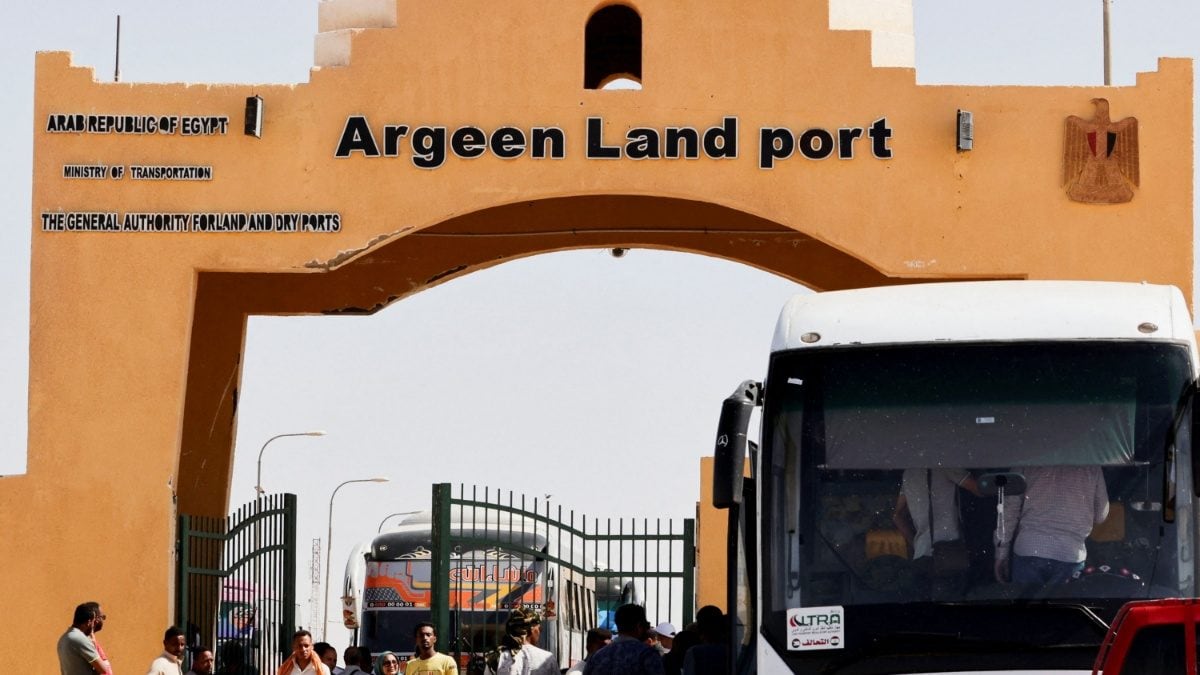Eight months pregnant, Malaz Omar left everything behind to flee with her husband, two toddlers and an elderly aunt from the fighting that has shaken the Sudanese capital for more than two weeks.
By the time the 34-year-old arrived in Egypt, she had not eaten or showered for four days, passing through the Qustul border post where people were sleeping on the ground and had nothing to cover their heads scorching sun.
His plight mirrors that of thousands of others who paid high prices to travel to northern Egypt by bus and truck, only to be stuck at railroad crossings for days.
“We just took painkillers on an empty stomach,” Omar said as she ate fried fish at a restaurant in Abu Simbel, just north of the border. “It was very difficult. Our country was destroyed but we are going to come back and rebuild it.”
Fighting that erupted on April 15 between the Sudanese army and the paramilitary Rapid Support Forces (RSF) led to airstrikes and artillery battles on Khartoum and its neighboring towns of Omdurman and Bahri, emptying the streets of civilian life.
“This war has hit the center and the heart of the country,” said Mohamed al-Noaman Ahmed, a 46-year-old Sudanese trader who was on the Egyptian border when he learned that fighting had broken out on April 15. He ran towards Khartoum. to pick up his mother, wife and four children and bring them to the border. “All security collapsed,” he said, near Qustul where he had crossed after returning to pick up an uncle with cancer.
Some in Khartoum fear leaving their homes or possessions unprotected or attempting an exhausting journey with sick or elderly relatives.
Those leaving have sought refuge in parts of Sudan outside the capital or headed for Sudan’s western, southern and northern borders. Some left by boat from Port Sudan to Saudi Arabia.
Egypt said on Monday that 40,000 Sudanese had crossed its border, and the United Nations warned that more than 800,000 could flee Sudan, which has a population of 46 million, if fighting continues.
“MERCHANTS OF WAR”
As numbers increased and fuel became scarce, bus prices to Egypt rose to around $500 per person.
Those who can afford the journey are relatively wealthy, but many arrive through the Arqeen and Qustul crossings on either side of Lake Nasser in reduced condition.
“There are war mongers exploiting the crisis for profit,” said Leem al-Sheikh, a 23-year-old dentist who took almost a week to reach Abu Simbel from Omdurman.
“We are privileged,” she added. “There are many who could not afford to flee the war.”
A group of women and elderly parents with children could be seen emerging into Egyptian territory in Arqeen with faces and clothes covered in dust, dragging carts full of bags before boarding a bus for Cairo.
Since adult men need visas to enter Egypt, men are usually left behind. Many are waiting in Wadi Halfa, in northern Sudan, to apply for a visa.
Some complained about the lack of food, water, shelter and toilets at crossing points. They say they slept in buses or on roads strewn with garbage, or inside a closed area between the two border posts.
‘VERY SAY’
Farid Mahgoub Taha, a 77-year-old man who fled Khartoum, said he found a “very serious” situation in Arqeen, believing services were better on the Egyptian side.
“It wasn’t suitable for humans, not even animals,” he said.
Sheikh said people were being subjected to lengthy and aggressive interrogations by Egyptian officials.
“They humiliate us. They’re screaming and saying if you don’t wait we’ll fire you,” she said.
An Egyptian border guard said staff were working around the clock to deal with the influx. The Egyptian Foreign Ministry said authorities were providing rescue and emergency services at crossing points and trying to speed up entry procedures by beefing up border staff.
A Khartoum resident who gave only his first name, Khaled, said he decided to stay in the capital because he was worried about how his sick grandmother and a sister who sometimes has convulsions would come out of it, as well as the cost of the trip.
“I saw some friends of mine who have traveled before. They are still at the border, stuck in the streets,” he told Reuters in a video call. “I can’t put my family through this.”
Read all the latest news here
(This story has not been edited by News18 staff and is published from a syndicated news agency feed)











